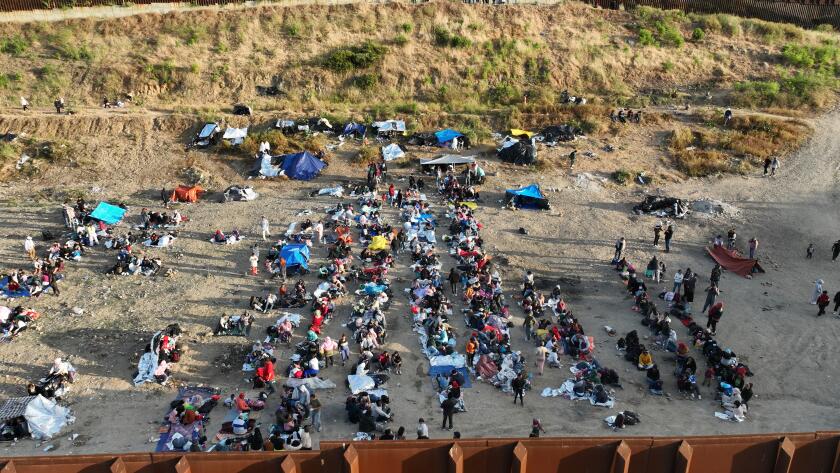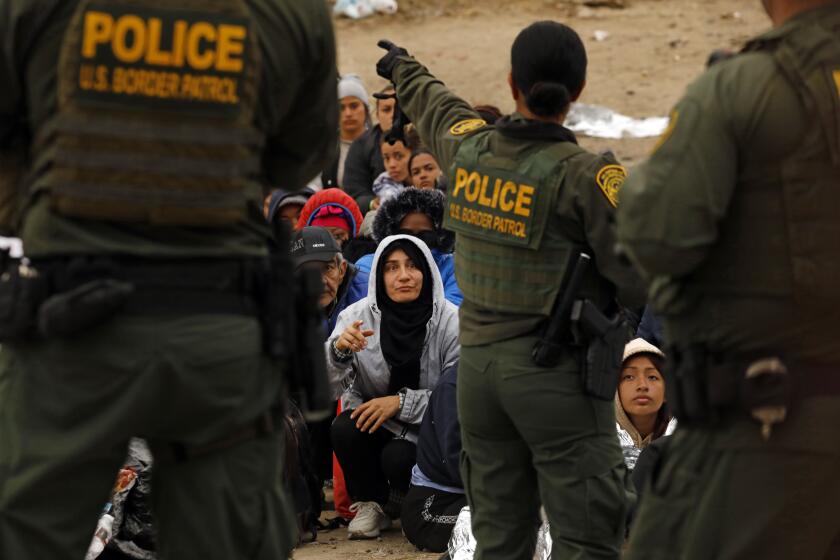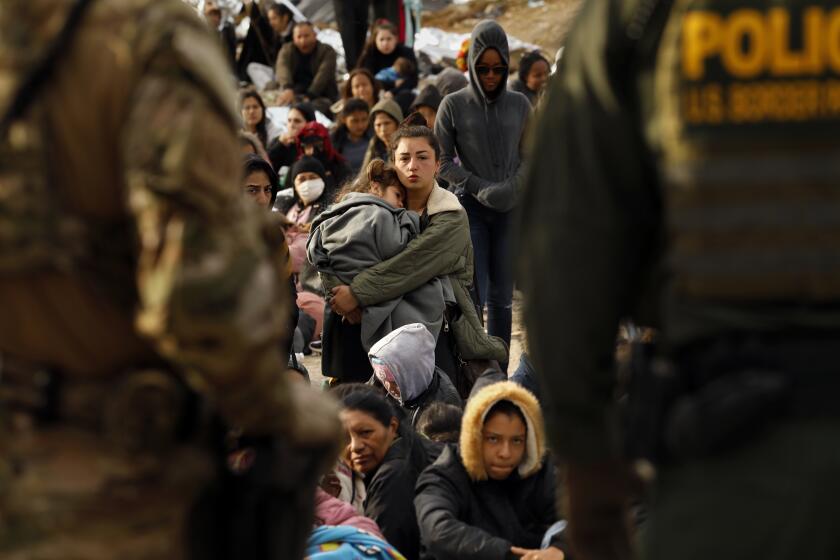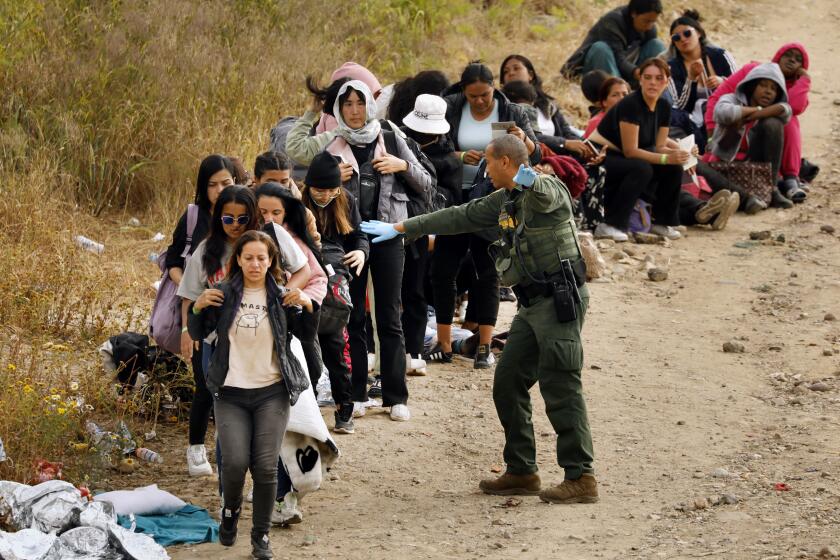Title 42 has expired. Here’s what’s happening at the border since immigration policy ended
- Share via
Secretary of Homeland Security Alejandro N. Mayorkas issued a warning Thursday that “starting tonight, people who arrive at the border without using a lawful pathway will be presumed ineligible for asylum.”
- Share via
SOMERTON, Ariz. — Contentious immigration policy Title 42 expired late Thursday night at the southern border with Mexico, but by Friday morning, U.S. officials reported that they had not seen the massive increase in migrant crossings that some were predicting and anxiously awaiting.
In the hours leading up to the termination of Title 42, which was used by the Trump administration amid the COVID-19 pandemic to turn away asylum seekers, migrants continued to gather near ports of entry, hoping for a new opportunity to enter the U.S. as confusion over the imminent policy changes and their impact persisted. On Friday, U.S. officials said that while the number of border encounters was still high, they had not experienced an influx of people overnight or any significant increase in migration.
The lifting of Title 42 was long anticipated but had been previously blocked by court rulings. Biden administration officials stressed this week that they had prepared for the moment by instituting a limit on asylum for those who cross without authorization and by significantly increasing resources sent to the border, among other actions.
On Thursday, the number of migrants in U.S. Customs and Border Protection custody dropped to under 25,000, according to internal data obtained by The Times, after hovering above 28,000 earlier in the week.
Government officials lamented a Thursday ruling from a federal judge in Florida that blocked the Biden administration from releasing migrants in custody without court notices. The measure, officials said, was necessary given the number of people crossing the border and concerns about overcrowding. The administration said it would comply with the ruling and was considering its next steps.
The end of Title 42 has spread uncertainty among thousands of U.S.-bound migrants from across the globe who are waiting in Mexico. Some are contemplating switching strategies. Many are trying to figure out what it all means.
There is a persistent fear that the transition away from Title 42 could be a fast track to deportation — making an already desperate situation worse.
“To me it feels like a great deception,” said Alexandre Jean Verneau, 26, a Haitian migrant who was at a church soup kitchen on Friday. “What I fear is that I could end up deported back to Haiti. That is the last thing I need.”
He is among the tens of thousands of Haitians who in recent years have headed for the United States from Chile. Authorities in the South American nation have been cracking down on immigration, prompting many people to make the long journey north through South and Central America and Mexico to the U.S. border.
Verneau said he spent four nights at the border in Texas, sleeping near hundreds of other migrants in the desert on U.S. land just north of the Rio Grande. Border Patrol finally opened a gate Friday morning to allow the migrants in. But the young Haitian man said he smelled a trap: He left the group and headed back to Ciudad Juarez on the Mexican side, declining to surrender to Border Patrol.
“It felt like a trick,” said Verneau, who still hopes to join relatives in New York. “I was afraid they would put me in a plane back to Haiti.”
He’s not sure what to do next, knowing little about how to apply for humanitarian parole into the U.S., which is available to some Haitians.
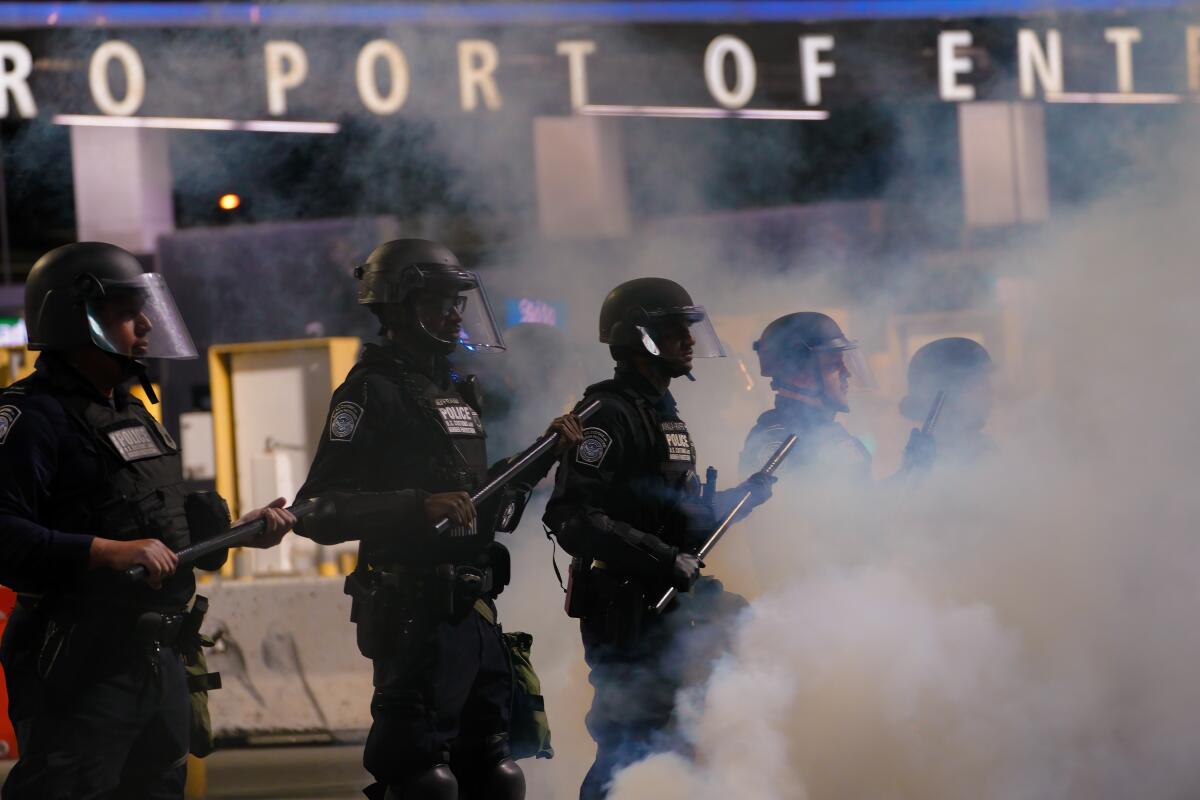
Homeland Security Secretary Alejandro N. Mayorkas issued a warning Thursday as Title 42 was expiring that “people who arrive at the border without using a lawful pathway will be presumed ineligible for asylum.”
Advocates for immigrants said the new limits on asylum were unlawful, and the American Civil Liberties Union filed a legal challenge to the policy late Thursday, seeking to block it.
Mayorkas noted that 24,000 Border Patrol agents and officers had been deployed to work alongside “thousands of troops and contractors, and over a thousand asylum officers to help enforce our laws.”
“Do not believe the lies of smugglers,” Mayorkas said in a statement directed at migrants. “The border is not open. People who do not use available lawful pathways to enter the U.S. now face tougher consequences, including a minimum five-year ban on re-entry and potential criminal prosecution.”
As the minutes ticked down to the end of Title 42, some asylum seekers wondered what it would mean for them — would they be processed under the rules in effect when they reached U.S. soil, or would they be processed under the new, more restrictive measures that went into effect Friday?
Among those waiting across the border from California were an Ecuadorean journalist and his family. He fled after threats related to his work, and after he ended up in between the U.S. and Mexican border walls, he began documenting the situation for his newspaper in Ecuador.
“We’re here to be heard about the problems in our country,” he said in Spanish. “We’re very vulnerable.”
That night, migrants fell asleep in the groups they’d been waiting in for days, wrapped in metallic blankets that the U.S. Border Patrol had distributed. On Friday morning, the families were still there, sitting on the cold ground.
Several families, including some fleeing Mexico, attempted to request asylum at the San Ysidro Port of Entry south of San Diego on Friday morning — without making appointments through the CBP One app, a new government requirement for seeking humanitarian protection. They were turned away.
Among them was a family of three: a father from El Salvador, mother from Guatemala and their 3-year-old son. They said they’d been kidnapped and robbed numerous times on their journey. After attempting to walk across the border near the Tijuana River and El Chaparral plaza earlier in the week, they were told that people of their nationalities couldn’t request asylum until Friday, they said.
The family had tried to request asylum in southern Mexico, but said they faced persecution there, and continued north.
“The authorities here in Mexico see one as a gold mine,” the father said. “They take all our money.”
Title 42, the policy used to keep asylum seekers out of the U.S. during the pandemic, expired Thursday night, ushering in a new era for U.S. border control.
Near the border in Arizona late Thursday, migrants lined up along a stretch of metal fencing next to the Colorado River on the Cocopah Indian Reservation, waiting to be taken to a Border Patrol processing center in Yuma.
There were crying babies, elderly people with canes and children asleep in their parents’ arms. People had fleece blankets slung over their heads, travel pillows and puffer jackets to stave off the light chill.
“Come over here,” a Border Patrol agent told the migrants, ushering them toward an open space where the barrier ended. “I want one single line.”
“OK, commander,” a migrant responded.
“Gracias!” a child yelled.
On the other side of the wall, a group of about 30 people walked toward Border Patrol.
“Run for your lives,” a migrant on the other side told them through the slats, waving his arms in encouragement. “You’ve arrived.”
A Yuma County sheriff’s deputy said only a few dozen people usually arrive by that time of night. On Thursday, there were at least a couple of hundred.
A group of 10 more people ran up and got in the back of the line. Then 10 more. They were out of breath, gasping for air.
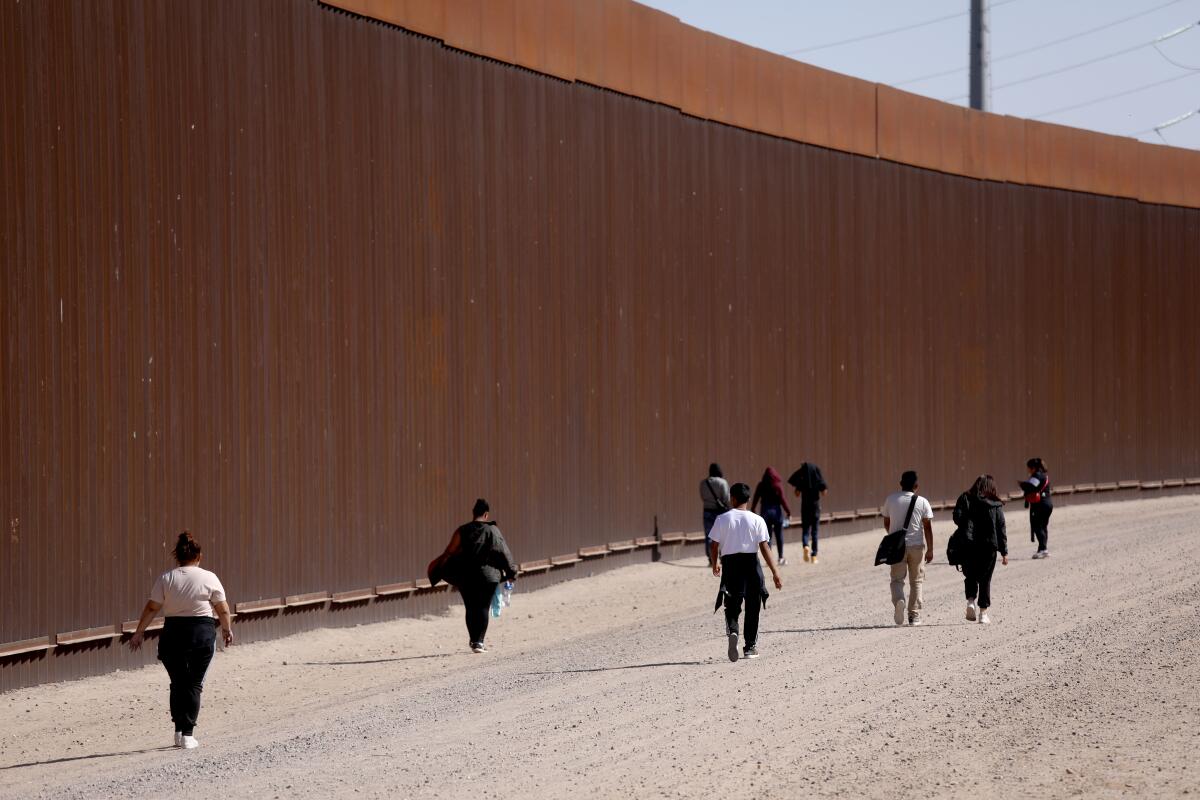
A 21-year-old man, 19-year-old woman and 8-year-old boy — orphaned siblings from Ecuador — walked to the end of the line next. The man, who asked to be identified by his initials, J.Z.G., winced in pain. The backs of his shoes were folded under his heels. Something had gotten inside one shoe and cut his foot.
He said he and his siblings had flown to Nicaragua and walked from there to the U.S. border because of political instability back home.
“We had to emigrate,” he said.
They learned through social media that by midnight on May 11, “the ability for Ecuadoreans to enter here would expire,” he said.
“It affects everyone, not just Ecuadoreans,” his sister corrected him.
They weren’t sure what would happen when they got to the front of the line. But they were hopeful that they could still request asylum since it wasn’t yet midnight. They had hustled to make it in time.
Facing more migrants at the border and significant capacity constraints in detention centers ahead of Title 42’s expiration, the Biden administration is cutting the time asylum seekers have to find attorneys.
What they didn’t realize was that Title 42 had expired an hour earlier — at midnight Eastern time.
By Friday morning, a few dozen migrants were lined up and loaded onto buses to be processed by border authorities.
Fernando Quiroz with the Arizona-California Humanitarian Coalition cleaned up trash and belongings left behind by migrants.
“What’s sad is yesterday was the whole chaos. Now ... ,” he said, gesturing at the empty space. Dropped in the dust were Nike slides, Mexican pesos, toothbrushes and empty SIM card cases. There was a Spanish-language copy of the New Testament, a Dominican woman’s Mexican humanitarian visa, a near-empty bottle of perfume and a copy of a Peruvian man’s birth certificate.
Quiroz, a lifelong Yuma resident, has been cleaning up local border entry points and handing out water and snacks to migrants almost daily for the last two years. He said that as the son of immigrants and a person of faith, he was driven to help.
His goal is twofold, he said: Restore the land and correct the narrative.
Border Patrol agents tell migrants to drop everything and get in line, he said, so they can be processed as quickly as possible. Sometimes the wait can be a while.
Title 42, a public health policy invoked to control migration at the start of the COVID-19 pandemic, was lifted Thursday night.
“So, a lot of the trash from them waiting is there — but that’s the image,” he said. “The anti-immigrants, the Fox News of this world will come and that’s what they record. And they record the trash, like, ‘Look at these people, they’re dirty.’”
Quiroz said he worries what will happen with Title 42’s expiration and stronger consequences in place for asylum seekers. Unable to hand themselves over to Border Patrol, they may be led by coyotes — smugglers — through more dangerous, desolate terrain, he said, to attempt to enter the U.S. undetected.
“They’re putting lives in danger, and that’s the reality,” he said. “The policy and the coyotes.”
Ten miles south, at another entry point along the border wall in San Luis, Ariz., eight migrants waited for Border Patrol agents to arrive. Two women from Colombia said they’d arrived overnight. A couple with three children ate potato chips and drank iced tea as a handful of photographers snapped photos of them.
Just a day earlier, about 150 migrants had gathered at the same spot.
At 8 a.m., a white bus driven by Border Patrol agents pulled up and let the small group board. The only people left were journalists and a couple of volunteers from Quiroz’s organization.
Friday afternoon in Somerton, Jose Martinez, 25, and his 1-year-old son, Yunior, waited for a bus to take them to a motel room for the night after being released from Border Patrol custody, in which they’d spent the previous six days. Martinez said he had heard that Title 42 was ending and wanted to ensure he and his son could safely make it to the U.S. before stricter rules set in.
They arrived by bus Sunday in San Luis Rio Colorado, Mexico, where they crossed the border and turned themselves over to Border Patrol. Border agents gave Martinez a notice stating that he must appear at an Immigration and Customs Enforcement office within 60 days. He said he planned to do that after he gets to Boston, where an aunt lives.
The single father said he was simply looking for a better life, but that after making the journey, he wouldn’t recommend it.
“It’s not worth it,” he said. “It’s too big a risk.”
Times staff writers Castillo reported from Somerton, Ariz., McDonnell from Ciudad Juarez, Mexico, and Aleaziz from Healdsburg, Calif. San Diego Union-Tribune staff writer Morrissey reported from Tijuana. Union-Tribune en Español staff writer Alexandra Mendoza contributed to this report.
More to Read
Get the L.A. Times Politics newsletter
Deeply reported insights into legislation, politics and policy from Sacramento, Washington and beyond. In your inbox three times per week.
You may occasionally receive promotional content from the Los Angeles Times.
